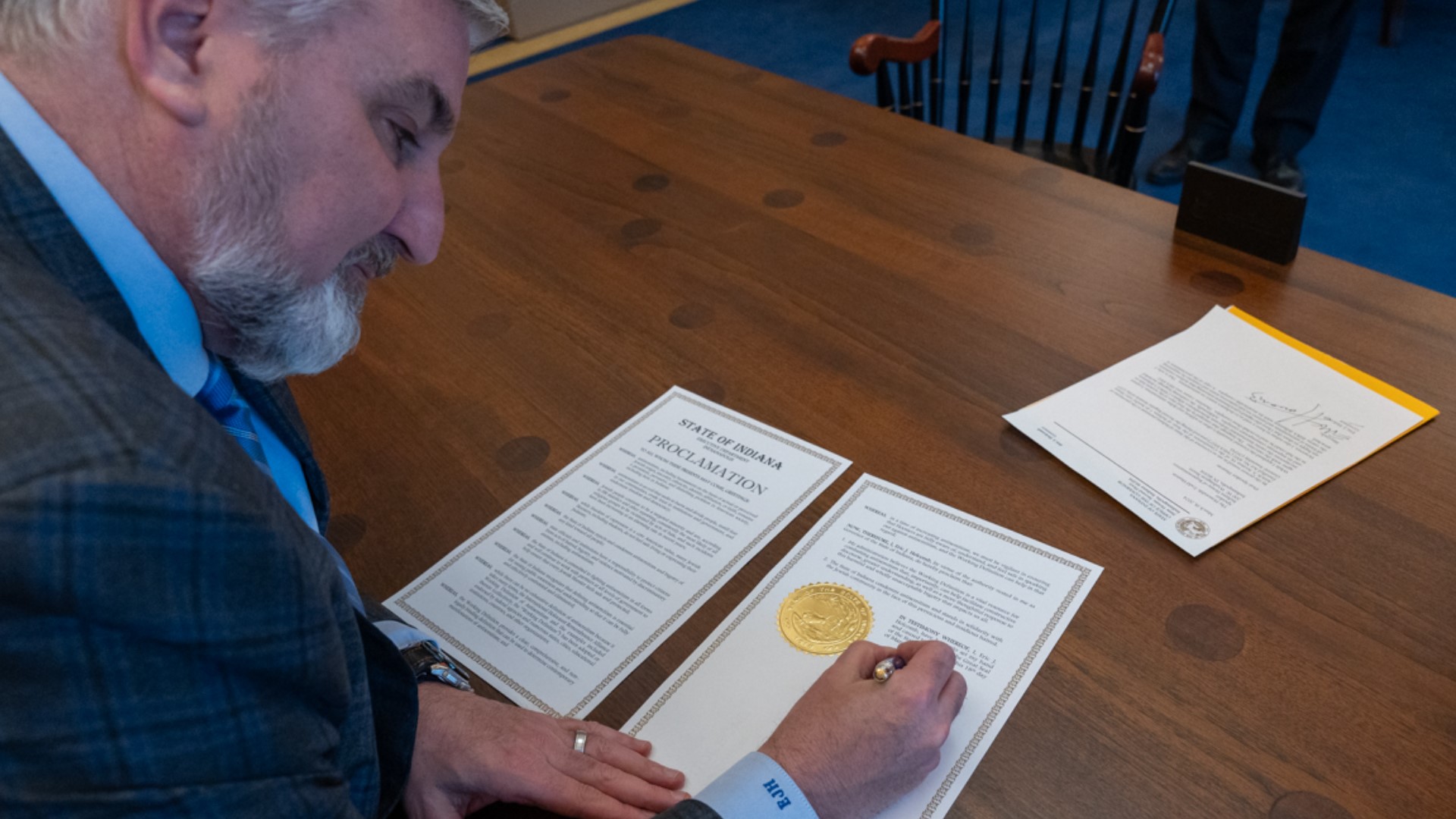INDIANAPOLIS — Gov. Eric Holcomb vetoed a House bill that dealt with defining antisemitism at the state’s public institutions of higher education.
Holcomb vetoed HEA 1002 on Monday, March 18 and issued the following statement:
“While I applaud the General Assembly’s effort to address and define antisemitism, I cannot agree with the outcome therefore I vetoed HEA 1002. The language that emerged in the final days of the legislative session fails to incorporate the entire International Holocaust Remembrance Alliance (IHRA) definition and its important contemporary examples. Additionally, the confusing language included in the bill could be read to exclude those examples therefore I must veto HEA 1002."
Despite vetoing the bill, Holcomb signed a proclamation Monday, condemning all forms of antisemitism.
"I also refuse to leave a void as to Indiana’s stance on antisemitism," Holcomb said in a statement on the proclamation, which "ensures we join numerous states and countries by supporting the entire (International Holocaust Remembrance Alliance) definition with its inextricable examples.”
The Indianapolis Jewish Community Relations Council released the following statement on the veto:
The Indianapolis Jewish Community Relations Council (JCRC) thanks Governor Eric Holcomb for his careful reading of the final version of House Enrolled Act (HEA) 1002, and his thoughtful attention to, and consideration of, the concerns raised in recent days by national experts and the Attorney General that compelled him to veto the enrolled act and issue a proclamation. We appreciate that his proclamation clarifies these concerns and affirms that Indiana endorses the International Holocaust Remembrance Alliance’s (IHRA) definition of antisemitism including the reference to the specifically identified examples of contemporary antisemitism.
JCRC remains grateful to the Indiana General Assembly for overwhelmingly passing HEA 1002 and standing with the Indiana Jewish community as it works to confront increasing antisemitism.
We remain committed to working with HEA 1002 author Representative Chris Jeter (R-Fishers) and Senate sponsor Senator Aaron Freeman (R-Indianapolis) and thank them for their tireless work. We would also like to thank Speaker of the House Todd Huston (R-Fishers) for making HEA 1002 a House Republican priority bill. JCRC will work diligently with members of the Indiana General Assembly, executive agencies, statewide educational institutions, and statewide educational organizations to ensure that the guidance of Governor Holcomb's proclamation is correctly applied to identify and confront antisemitism and meet the needs of Jewish students in K-12 and higher educational settings.
The Indiana Muslim Advocacy Network also issued a statement after the veto Monday:
"The Indiana Muslim Advocacy Network (IMAN) expresses disappointment regarding Governor Holcomb's decision to veto HB 1002. This action overlooks the bipartisan effort between the Indiana General Assembly and various communities to achieve a balanced agreement on the bill. IMAN recognizes the importance of collaboration and compromise in the legislative process, and the veto of HB 1002 represents a setback in these efforts.
From the beginning, we have made it clear that the examples referenced by the IHRA definition could be used to stifle freedom of speech in schools and on college campuses by labeling the criticism of Israel as antisemitic. Governor Holcomb’s proclamation disregards our meritorious concerns. While a proclamation is not legally binding, we will continue to monitor free speech concerns across the state to prevent any misinterpretation or encroachment on constitutional rights.
As religious minorities, we understand the impact of hate and stand in unwavering solidarity with the Jewish community in combating antisemitism. We will persist in our endeavors to safeguard free expression in educational institutions across Indiana and ensure the protection of our Muslim students."
Earlier in the legislative session, the House and Senate passed different versions of this bill.
A sticking point was whether the bill should reference the IHRA and its definition of antisemitism, a definition already used by 35 states and the federal government, along with 45 countries.
The original version of the bill, which started in the House, referenced the IHRA, its definition of antisemitism, and various contemporary examples of antisemitism.
Critics of the original bill argued it would limit free speech and criticism of the state of Israel.
The Senate passed a different version, which did not reference the IHRA or its definition, a move many in the Jewish Community did not support.
The final version of the bill restored the IHRA reference and its definition of antisemitism and was passed unanimously in the House and by a vote of 45-1.

